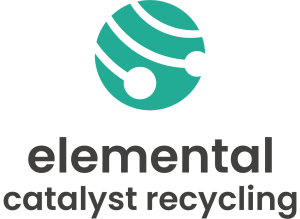Professional recycling
If you decide to give us a spent catalyst, you do not have to worry about its impact on the environment, as we professionally recycle this type of waste. In addition, by recycling your automotive catalyst, you contribute to saving the precious metal resources available on our planet! Recycling of automotive catalysts enables the recovery of up to 95% of the platinum metals contained therein; compared to traditional mining, it saves significant amounts of energy (processing 1 tonne of spent catalysts can prevent the mining of 150 tonnes of ore or alternatively 400 tonnes of gangue).
Professional recycling
If you decide to give us a spent catalyst, you do not have to worry about its impact on the environment, as we professionally recycle this type of waste. In addition, by recycling your automotive catalyst, you contribute to saving the precious metal resources available on our planet! Recycling of automotive catalysts enables the recovery of up to 95% of the platinum metals contained therein; compared to traditional mining, it saves significant amounts of energy (processing 1 tonne of spent catalysts can prevent the mining of 150 tonnes of ore or alternatively 400 tonnes of gangue).
Automotive catalyst recycling market
Annually, more than 400 tons of PGM (Platinum Group Metals) are mined worldwide, which mainly include Platinum, Palladium and Rhodium, as well as Iridium and Ruthenium. Global resources of PGM are estimated at 66 thousand. tonnes, of which 95% are in South Africa. An increasing amount of PGM is recovered in the process of recycling car catalysts and jewelry. For example, in 2018, approximately 63 tons of recycled platinum, 96 tons of palladium and 10 tons of rhodium were reused.
Extraction
The largest producer of PGM is South Africa, which globally mines 73%, 39% and 82% of platinum, palladium and rhodium, respectively. Russia is also a major producer of palladium, responsible for approx. 41% of its global production. A considerable amount of PGM used comes from recycling, including automotive catalysts (68% platinum, 84% palladium and 100% rhodium), electrical devices (2% platinum, 16% palladium) and jewellery (30% platinum, 1% palladium). It should be emphasised that the mining of platinum metals is much more expensive than obtaining them by recycling, as the platinum metal content per tonne of ore is 2–6 g, compared to approx. 2 kg of PGMs per tonne of catalysts.
Automotive industry
The greatest demand for PGMs is generated by the automotive industry, where they are used in catalytic converters (catalysts). Vehicle production accounts for approx. 65% of the total demand for PGMs. The increasingly restrictive emission standards are likely to cause an increase in demand for PGMs in the future. Car manufacturers who want to meet the requirements will be forced to introduce more advanced designs, which may result in rising demand for PGMs.





